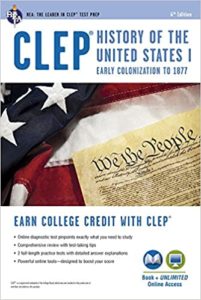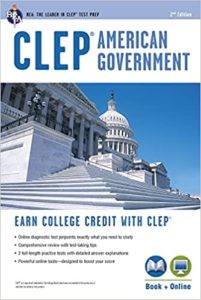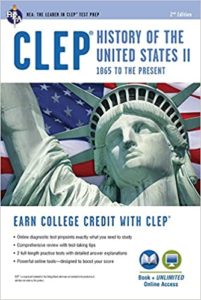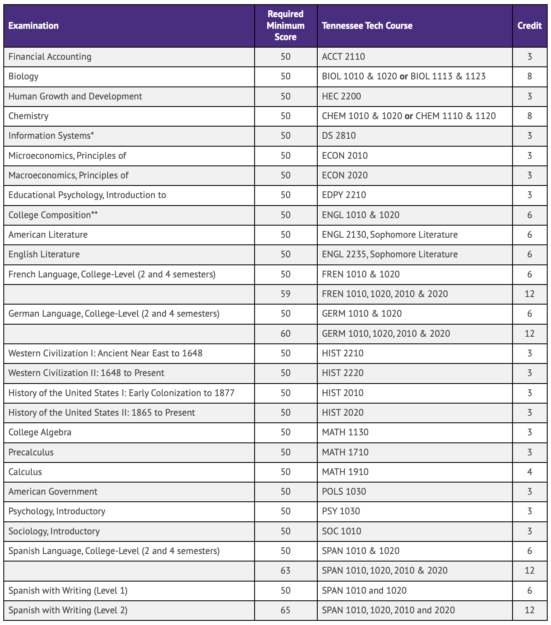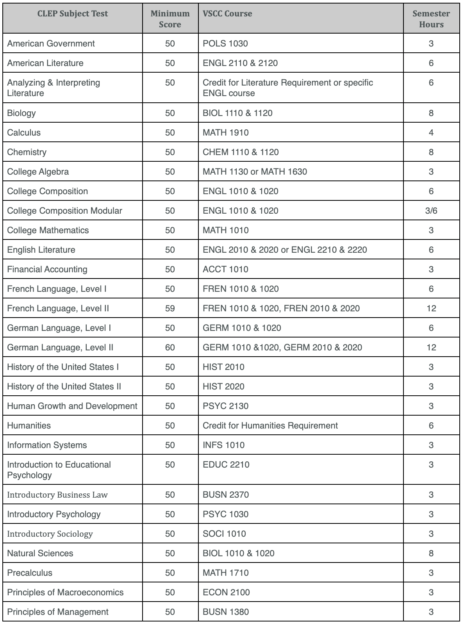
Every season of homeschooling has its special moments and we have enjoyed all of them. As we launched our oldest into college this past year after 12 years of homeschooling, we were blessed with the reward of him starting his freshman year with multiple college credits. Without dual enrollment or correspondence courses, he entered his freshman year with 12 credits under his belt and added 3 more in the fall while he was taking his normal full-time-college-student class load. How? By clepping for college credit!
A Tale of Two Brothers
Our post-graduation plans actually began several years ago when we attended a homeschool convention seminar titled College Out of the Box by Renee LoDolce. It was an eye-opening experience to say the least. The speaker shared how her son earned his bachelor’s degree completely online for less than $6,000 and had accomplished this feat during high school! Although we weren’t mentally ready for that step, this workshop became the catalyst for our future college plans in general. We not only thought about how we might give our son a head start, but we also considered how he might avoid some of the lesser-appealing general education classes we remembered from our college days. When we went to high school, we were never educated on CLEP testing or any other type of non-traditional methods of achieving college credit, and it truly blew our minds that our son could simply take a test (without taking an AP course) and earn real hours equivalent to university courses.
(We later came across another book, Homeschooling for College Credit by Jennifer Cook-DeRosa that helped us tremendously in clearing up common misconceptions and other things to consider when clepping for college credit.)
The only way to know if CLEP testing was a legitimate way to earn college credit was to try it out. At the close of his junior year of high school (after finishing his high school U.S. History curriculum), our oldest son continued preparing for the American History 1 CLEP exam using the CLEP® History of the U.S. I Book + Online (CLEP Test Preparation). He earned a passing score. During his senior year, he prepared for the American Government exam using the CLEP® American Government Book. Again, he earned a passing score. This is the point we realized that this was a legitimate reality because, with his scores on these two exams – along with the 6 hours of English credit he received from his ACT score – our son now had 12 hours of college credit before stepping foot into his first college class! (It even said so on his college transcript!)
While taking a full course-load last semester, he also prepared for the American History 2 exam (using the CLEP® History of the U.S. II Book). Again, he earned a passing score. Because of the flexibility of CLEP testing, he is now planning to pursue a double major in chemistry and biology (along with a minor) because he has more flexibility with his schedule. Instead of taking courses in humanities and social science, he can earn those general education requirements through CLEP so he can better focus on his interests.
As homeschoolers, we’re always looking for ways to give our children a leg up and to streamline their education. But this doesn’t mean we have a cookie-cutter plan. Although our oldest is attending a traditional brick and mortar university, we’re not sure that will be the path his siblings will take. Our 15-year-old is more interested in pursuing a hands-on field such as mechatronics, so we’ve been looking at community college and/or trade schools with him. Even if he is not interested in attending college, we want him to have at minimum an Associate’s degree prior to entering the work force. Thus, we’re planning his college credits to more closely align with the community college standards. He recently passed his first CLEP (American History – using the same CLEP® History of the U.S. I Book as his brother), so he’s already on the path of earning his Associate’s in Business.
UPDATE: Our oldest son is coming up on his senior year of college. He has earned a total of 30 hours via testing, which means he was able to double major in the sciences (and add a minor in the midst of it!) WITHOUT increasing his overall workload. He’s scheduled to graduate on time (in 4 years) having not ever taken over 15 hours in a semester. Our second son is graduating from high school in a couple of weeks. He has earned 18 hours thus far via testing and plans to wrap up another 17 hours of CLEP credit to cover his humanities (6 hours), social sciences (3 hours), and chemistry (8 hours) requirements. Surprisingly, he ended up deciding to attend Tennessee Tech in the fall to major in mechanical (or possibly electrical) engineering instead of business. I would have never thought he would choose this path, but he truly enjoyed his high school physics course and has always loved tinkering with widgety things. His tour of Tennessee Tech’s engineering department sealed the deal. The program is simply fantastic. And… CLEP testing will allow him to take 12-15 hours per semester as an engineering student and still graduate in a 4-year period (which is often difficult to manage when majoring in engineering).
We Interrupt this Program to Say…
Be Sure to Give High School Credit First!
Before climbing on the CLEP credit bandwagon, let us forewarn you. A homeschool parent/teacher’s first priority (aside from instructing a child in the way s/he should go) is not clepping for college credit. It’s graduation from high school. Your child can earn 30 hours of CLEP credit but then not end up with a high school diploma. How? Well, if you don’t ensure they are studying what they are required to study according to state high school graduation standards, they will not earn the credit required to receive a high school diploma. So… what to do?
First, check your state department of education requirements for graduation. Come up with a high school plan for that first and foremost. (Click here to see an example plan for fulfilling high school credits along with suggested curriculum.) Then… fit the CLEP tests in where they make sense. Below is an example of how we’ve laid this out for our second son.
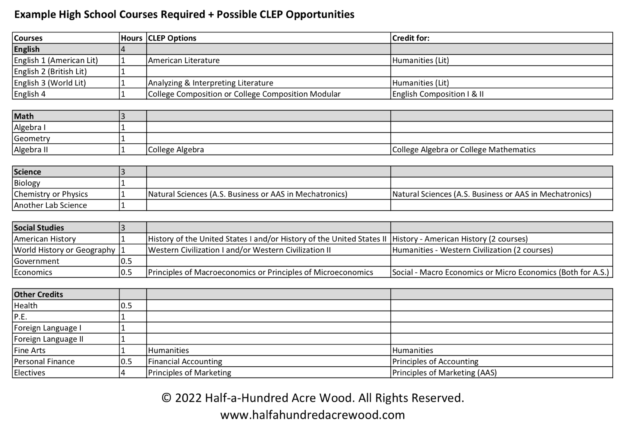
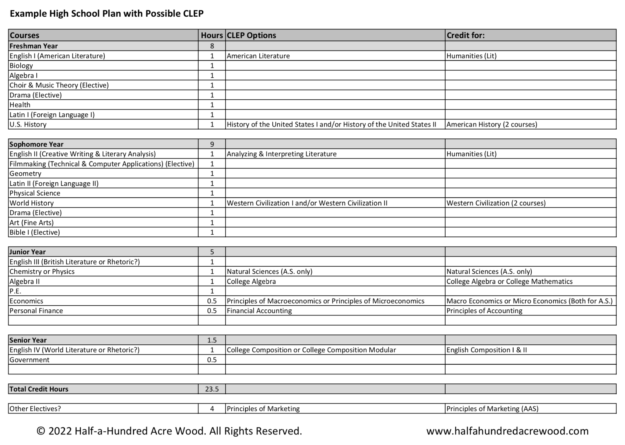
Note: we have not included all possible clepping opportunities for this plan because there are certain courses he doesn’t need for an A.A.S. in Mechatronics or an A.S. in Business. He also completed most of his high school coursework in his freshman and sophomore years so that he has more time open during his junior and senior years to work towards an associate’s degree.
CLEP Tests Available
Below we’ve included a list of the available CLEP exams as of 2022 and what courses they might apply to.
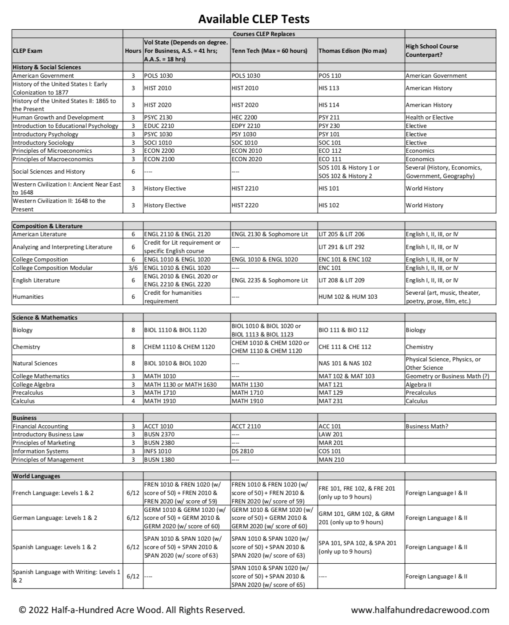
We recommend laying out a plan for each of your students based on high school graduation requirements for your state. You can refer to this post for an example high school scope and sequence for the state of Tennessee.
College CLEP Credit Comparison Example
Below we have two charts to show how CLEP exams are applied for credit at two different schools. There is usually a maximum number of credits that universities will accept. Check with your university of choice to determine their policies regarding testing or clepping for college credit, for this can vary widely.
At Tennessee Tech University, up to 60 semester hours of credit may be earned through CLEP exams (or any combination of correspondence, dual enrollment, military equivalency, etc.). Below is an example of the CLEP exams Tennessee Tech accepts and to which course they apply. Each college or university may have a different policy so be sure to check with your chosen school. The information can often be found by searching for “credit by exam” or “prior learning assessment” on the university website.
The following table from VolState Community College highlights the differences in credits that exist between colleges.
Many of these courses fulfill the general education requirements in humanities, social sciences, and electives. It’s also possible to CLEP out of science, math, and business classes.
Information regarding purchasing and scheduling a CLEP test can be found at www.collegeboard.org.
Other Avenues towards a College Degree
Although our family has focused on clepping for college credit, there are many other avenues of credit that can be explored and may apply to your particular situation. If you’re planning on a completely online degree, the College Out of the Box publication will be immensely helpful. Another valuable resource is Homeschooling for College Credit by Jennifer Cook-DeRosa, which covers every type of college credit available. The author walks through the steps she has taken with her family to earn 9 degrees from 7 different colleges. (You might want to pay special attention to the section on transfer degrees vs. non transfer degrees.)
There is usually a list of other possible sources of credit on college websites as well. The below list is from VolState Community College, but your chosen school should have a similar list along with information regarding which subjects can be credited. As you can see, there are a multitude of possibilities for your student to acquire college credit and allow them to earn a degree with less time and cost than traditional methods.
- Continuing Education Credit
- Credit for Service in the Armed Forces
- Advanced Placement Credit
- Credit for Cap Exam
- Credit for CLEP Subject Examinations
- Credit by Local Examination
- Credit by External Examination
- Credit for On The Job Training
- Foreign Language Placement Testing-and Credits Granted
- Credit for Private Music Instruction
- Credit for Music Theory
- Credit for Classic Piano
- Portfolio Credit
- International Baccalaureate Credit
We encourage you to check out Homeschooling for College Credit and College Out of the Box for more information on the variety of options available. Even so, we want to share with you why we are so pleased with the CLEP credit option…
Advantages of Clepping for College Credit
- Minimal preparation time. Of course there are cost savings, but even more appealing for us is the time savings! The flexibility provides the advantage to custom-fit your college experience: graduate early (less expense!), pursue a double major, start Masters Degree coursework early, work while in college, conduct research with a professor, etc., etc., etc.
- Minimal indoctrination. Exams are available to receive credit for all humanities, social science, and electives courses that are considered general education requirements.
- Great alternative to dual enrollment. There’s no commute (which is a big deal for those who live an hour or more from a college campus). You don’t have to subject high school students to liberal professors with hidden agendas. Students can study at their own pace.
- No grade assigned. Just credit hours earned. Unlike dual enrollment, the student earns college credit hours without a grade assigned. (With dual enrollment, the student can make a poor grade, which will figure into his college GPA.)
- Earn an associate’s degree during high school. It takes some intentional planning, but it’s possible for your student to graduate from high school with an associate’s degree using a combination of CLEP, correspondence or online college classes, and/or dual enrollment.
- Start at age 13. If you feel your student is ready, s/he can begin taking CLEP exams at age 13. (A government-issued ID is required.)
- Continue through college. Our oldest son (who is entering his sophomore year in college next year) continues to CLEP out of required general elective courses. This has freed him up to take courses he actually wants to take, so he has now declared a double major. And even with adding the courses for a double major, he will STILL have room in his schedule to work towards his masters degree before he graduates with his bachelors!
Don’t Overdo It
One final note, please don’t overdo it starting out. These tests can be overwhelming for homeschool students who are not used to testing. They are not easy! Your student will need a very good grasp of the subject material in order to pass these tests. The good news is that a quality high school course, a used college textbook, and some CLEP preparation material will adequately prepare them. Also, ModernStates.org provides free CLEP-prep courses that includes free online textbooks and resources, and they will even provide a test center reimbursement if you meet the criteria.
Your students can prepare at their own pace and take the test when they’re ready. The look on their faces when they earn that first college credit is priceless!
If you have questions about clepping for college credit, hop down to the comments or email us and we’ll do our best to answer them!
For more of our thoughts, recommendations, and curriculum reviews for high school, visit this section of our website.



